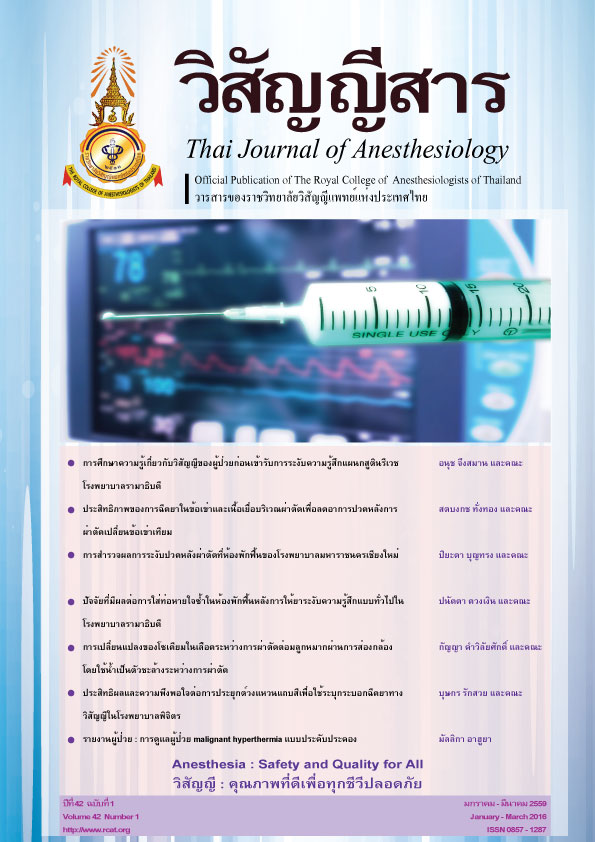A Preoperative Evaluation of Anesthetic Knowledge in Obstetric and Gynecological Patients in Ramathibodi Hospital
Main Article Content
Abstract
Background: Pre-anesthetic assessment is crucial. It aims to ensureperioperative safetyand improve anesthetic outcomes. Anticipated plans and purpose of anesthetic management should be clearly explained by an anesthesiologist to provide a better understanding and to reduce patients’ anxiety. A previous study showed a detailed preoperative visit is a method to improve patients’ perception in anesthesia. However, another study found level of patients’ knowledge in anesthesia was quite low. This study aimed to evaluate anesthetic knowledge in obstetricand gynecological patients.
Methods: A prospective, descriptive study was conducted in 200 patients who were in ASA 1-3, aged 12-80 years, undergoing an elective obstetric-gynecologic surgery under anesthesia, in Ramathibodi Hospital from July 2013 to March 2014. Shortly after pre-anesthetic visits, patients were requested to answer 18 closeended structure questions. Questions mainly focused on peri-operative knowledge in anesthesia and potential anesthetic complications. Two open-ended questions were added to ask about patients’ concerns and suggestions.
Results: In 8 out of 18 questions, over 80% of patients selected either “aware” or “partially aware”, while over 50% of patients selected either “aware” or “partially aware” in 13 out of 18 questions. The top three “not aware” responses were complications of spinal anesthesia (49.5%), duration of surgery (47%) and postoperative amnesia (41%). Patients’ knowledge significantly influenced by education, occupation, age, hometown and income (p<0.05).
Conclusions: Patients’ knowledge was fair. Efforts to provide education on perioperative anesthesia care and anesthesiologist’s role should be emphasized continuously to improve quality of anesthesia services.
การศึกษาความรู้เกี่ยวกับวิสัญญีของผู้ป่วยก่อนเข้ารับการระงับความ รู้สึกแผนกสูตินรีเวช โรงพยาบาลรามาธิบดี
บทนำ: การประเมินและเตรียมความพร้อมก่อนการผ่าตัดเป็นขั้นตอนที่สำคัญในผู้ป่วยที่มารับการผ่าตัด เป็นปัจจัยสำคัญที่ทำให้การระงับความรู้สึกในการผ่าตัดเป็นไปอย่างราบรื่น ปลอดภัย วิสัญญีแพทย์มีบทบาทในการประเมินและให้คำแนะนำผู้ป่วยเกี่ยวกับการเตรียมตัวรับการระงับความรู้สึก เพื่อลดความวิตกกังวล ให้ความมั่นใจ รวมทั้งตอบข้อสงสัยของผู้ป่วย การศึกษาก่อนหน้านี้พบว่าการให้ความรู้แก่ผู้ป่วยในช่วงก่อนผ่าตัดช่วยเพิ่มพูนความเข้าในที่ถูกต้องให้แก่ผู้ป่วยได้ อย่างไรก็ตามการศึกษาที่ผ่านมายังพบว่าความรู้ความเข้าใจของผู้ป่วยกี่ยวกับวิสัญญียังอยู่ในระดับต่ำ การศึกษานี้จึงมีวัตถุประสงค์เพื่อประเมินความรู้ความเข้าใจของผู้ป่วยสูตินรีเวช ในด้านวิสัญญี ก่อนการระงับความรู้สึก
วิธีการศึกษา: การศึกษานี้เป็นการศึกษาเชิงพรรณนาไปข้างหน้า ในผู้ป่วย 200 รายที่มาผ่าตัดทางสูตินรีเวชในเวลาราชการ ตั้งแต่ กรกฎาคม พ.ศ. 2556 ถึง มีนาคมพ.ศ. 2557 โดยผู้ป่วยอยู่ใน ASA 1-3 อายุตั้งแต่ 12 – 80 ปี หลังจากการเยี่ยมประเมินทางวิสัญญี ผู้ป่วยจะทำการตอบแบบสอบถามด้วยตัวผู้ป่วยเองซึ่งประกอบด้วยคำถามปลายปิด 18 ข้อ ที่มีคำถามหลักเกี่ยวกับความรู้เกี่ยวกับการระงับความรู้สึกรวมทั้งภาวะแทรกซ้อนนอกจากนี้จะมีคำถามปลายเปิดอีก 2 ข้อที่สอบถามเกี่ยวกับเรื่องที่ผู้ป่วยกังวล และข้อเสนอแนะของผู้ป่วย
ผลการศึกษา: จากคำถาม 18 ข้อ มีคำถาม 8 ข้อ ที่มีผู้ป่วยมากกว่าร้อยละ 80 ตอบว่า ทราบดี หรือ ทราบบ้าง และมีคำถาม 13 ข้อ ที่ผู้ป่วยมากกว่าร้อยละ 50 ตอบว่า ทราบดี หรือ ทราบบ้าง คำถามสามข้อที่ผู้ป่วยส่วนใหญ่ไม่ทราบได้แก่ ภาวะแทรกซ้อนของการให้ยาระงับความรู้สึกเฉพาะส่วน (ร้อยละ 49.5) ระยะเวลาในการผ่าตัด (ร้อยละ 47) และภาวะหลงลืมหลังผ่าตัด (ร้อยละ 41) ปัจจัยที่มีผลต่อความรู้ของผู้ป่วยได้แก่ การศึกษา อาชีพ อายุ ภูมิลำเนา และรายได้ (p<0.05)
สรุป: ความรู้ความเข้าใจของผู้ป่วยเกี่ยวกับการระงับความรู้สึกอยู่ในเกณฑ์พอใช้ อย่างไรก็ตามการเยี่ยมประเมินและให้ความรู้ก่อนการระงับความรู้สึกเป็นสิ่งจำเป็นและสำคัญเป็นอย่างยิ่งในการลดความวิตกกังวลของผู้ป่วยและการพัฒนาคุณภาพงานบริการทางวิสัญญี


